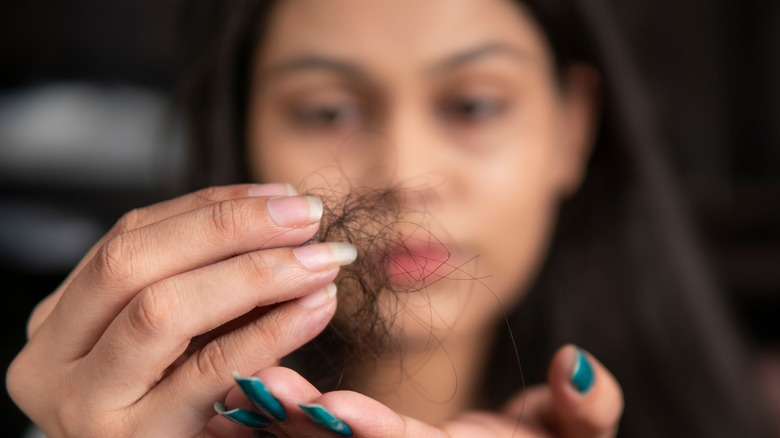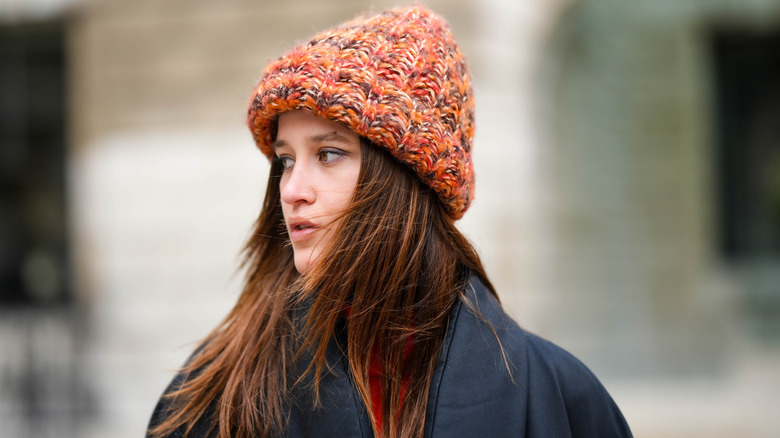Feel Like You're Losing More Hair During The Winter Months? It's Not Just You
Who doesn't love winter? It's a magical time of year when we get to deal with chapped lips, dry skin, and dandruff. We also must give up our pretty summer dresses in favor of the dreaded winter coat. There are days when we don't even get to see the sun because a dreary overcast sky prevents it from shining through. Often, we don't even get to enjoy any time outdoors. And to top it all off, there's the stress of holiday shopping. What's not to love!?
While we're dealing with all this, it can be easy to ignore the extra hair on the brush after we comb it through. After all, we normally shed around 50 to 100 hair strands every day. We might therefore try to convince ourselves that it's all part of the everyday shedding process until it's evident it's not. But that just leads to even more problems. Instead of accepting winter hair shedding for what it is, we could end up convinced that we're dealing with hair loss.
While hair shedding and hair fall are used interchangeably, there is an important distinction between them. Board-certified dermatologist Marisa Garshick, M.D., FAAD, detailed the differences with Mind Body Green: "Hair shedding refers to a condition known as telogen effluvium when the hair sheds more than usual. ... Hair loss often refers to a state when something stops the hair from growing." What you're experiencing in winter is most likely shedding, and there are a few reasons for it.
Here's why your hair sheds more during winter
While winter hair fall is a very real thing, there isn't one obvious culprit behind it. However, experts have several theories that might explain why we shed more during the colder months. One reason why this happens is the hair growth cycle. Throughout your life, your hair goes through phases that determine growth and loss. It begins with the anagen phase, during which your tresses actually grow. Once they stop, your locks transition into the catagen phase. After this is the telogen phase, where your hair essentially waits around until it's time to go by shedding away during the exogen stage.
Speaking to Bustle, Dr. Angela Phipps, D.O., A.B.H.R.S., and Medical Advisor to Hair Club, explained how the stages of hair growth can correlate to the colder months. "Some research suggests that women may experience slightly higher rates of telogen during the summer month of July, [where] one then sees the affected hairs falling out around three to four months later in mid-October or November," she noted.
Phipps added, "Exactly why this happens is unclear, but some suggest that stress brought on by the summer heat may have a factor." Another glaring cause for the additional hair shedding could be attributed to the extra dryness in the winter air, which can weaken your tresses by drawing out moisture. As dermatologist Emily Wise Shanahan informed Allure, we might also be holding onto more hair during the summer for added sun protection.
Reduce winter hair fall with a few simple tweaks
As tempting as it is, you have to skip out on the scalding hot showers during winter to protect your hair. Using hot water on your scalp strips away nourishing natural oils from it. It can also contribute to cuticle damage by breaking the protein bonds that form the cuticles. Hot water can also cause your hair to get drier at a time when it desperately needs the opposite. Don't worry, you don't have to take cold showers in the winter, just keep it lukewarm. In general, exposing your hair to heat during the wintertime isn't a good idea, so try to limit hot styling tools as well.
When you're stepping out for the day, try to ensure your hair is naturally dried because wet hair in the cold outdoors is a no-no. Dr. Angela Phipps explained to Bustle, "Wet hair is more vulnerable to damage than dry hair. Walking outside in winter with a wet head can cause hair to freeze and break." You can also better protect your hair from the elements by putting on a hat.
If dryness is causing the hair to fall, then moisturization is a sure-shot solution. You can pamper yourself with a nourishing hair mask, for instance. For some everyday hair love, swap out your regular shampoo and conditioner duo for one packed with hydrating ingredients like argan oil and hyaluronic acid. Also, get an oil massage to replenish moisture and promote hair growth.


